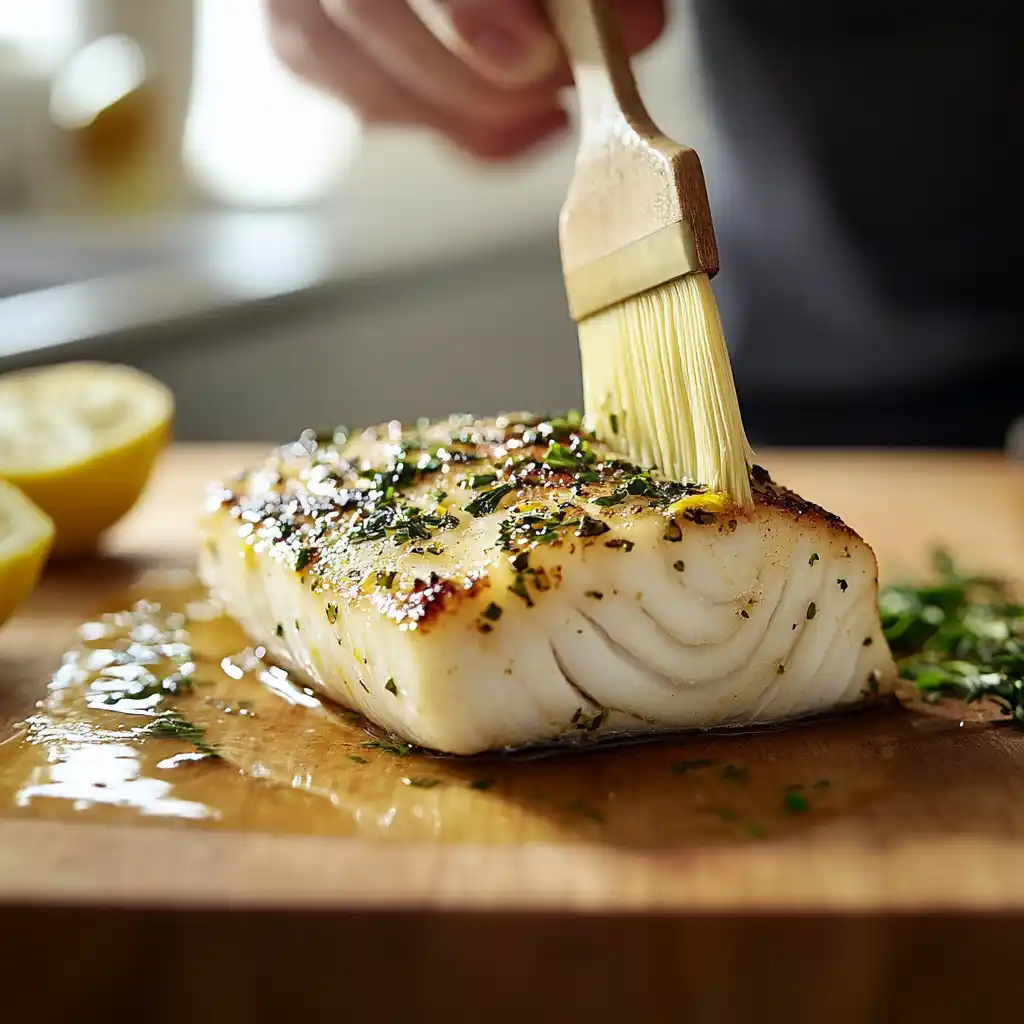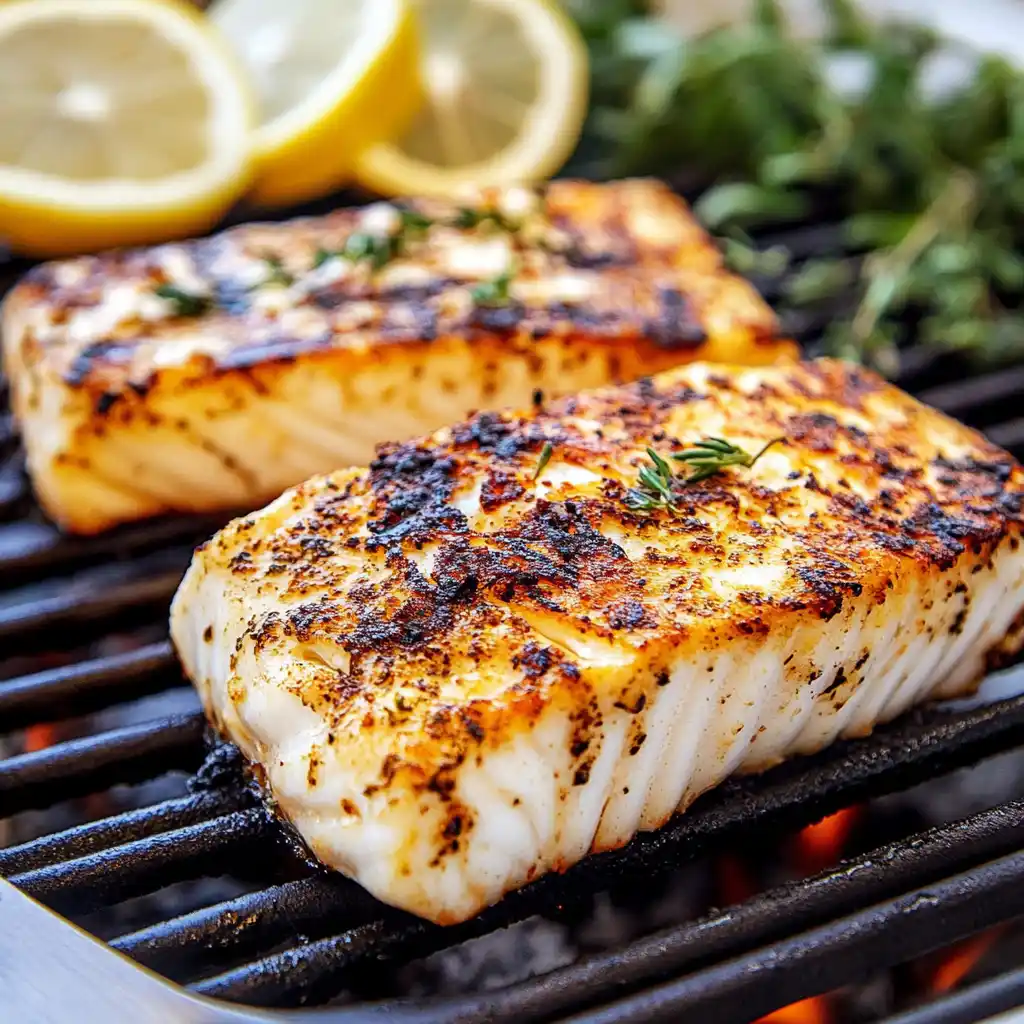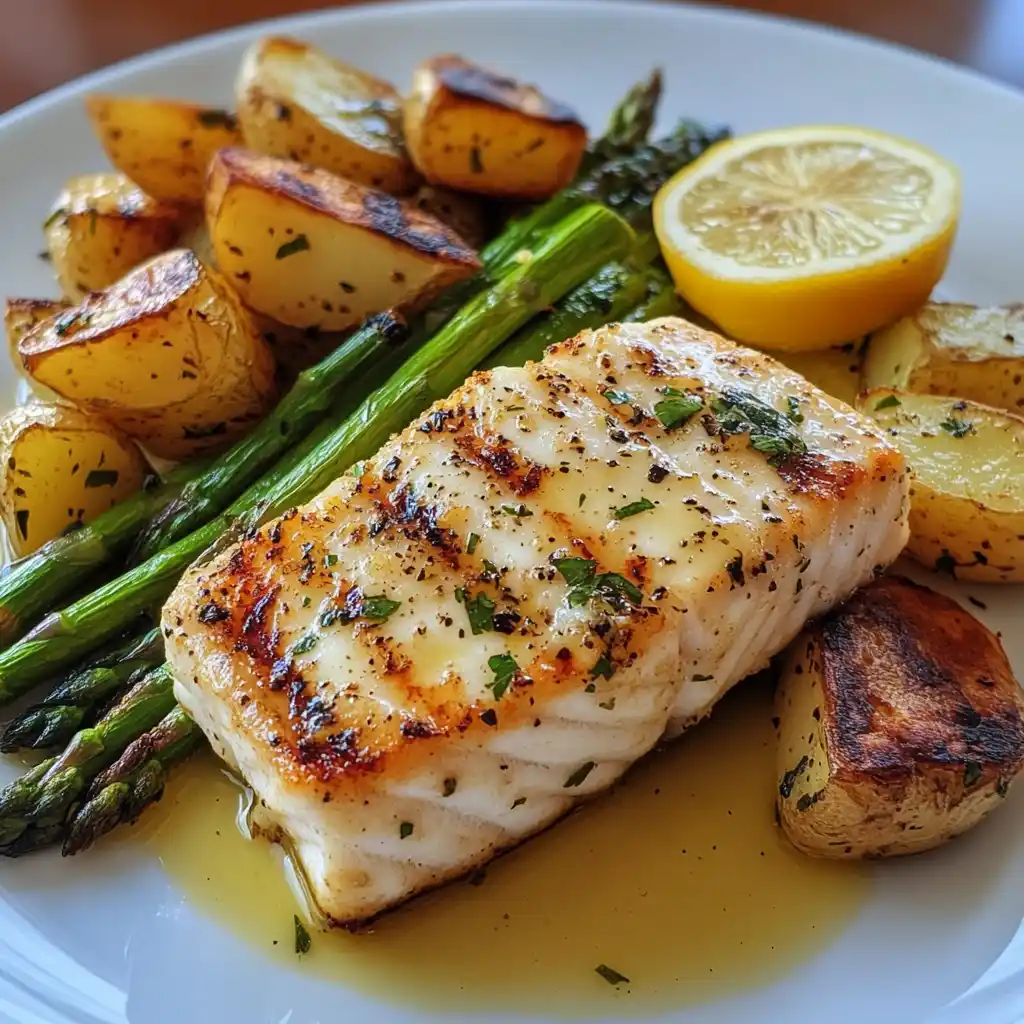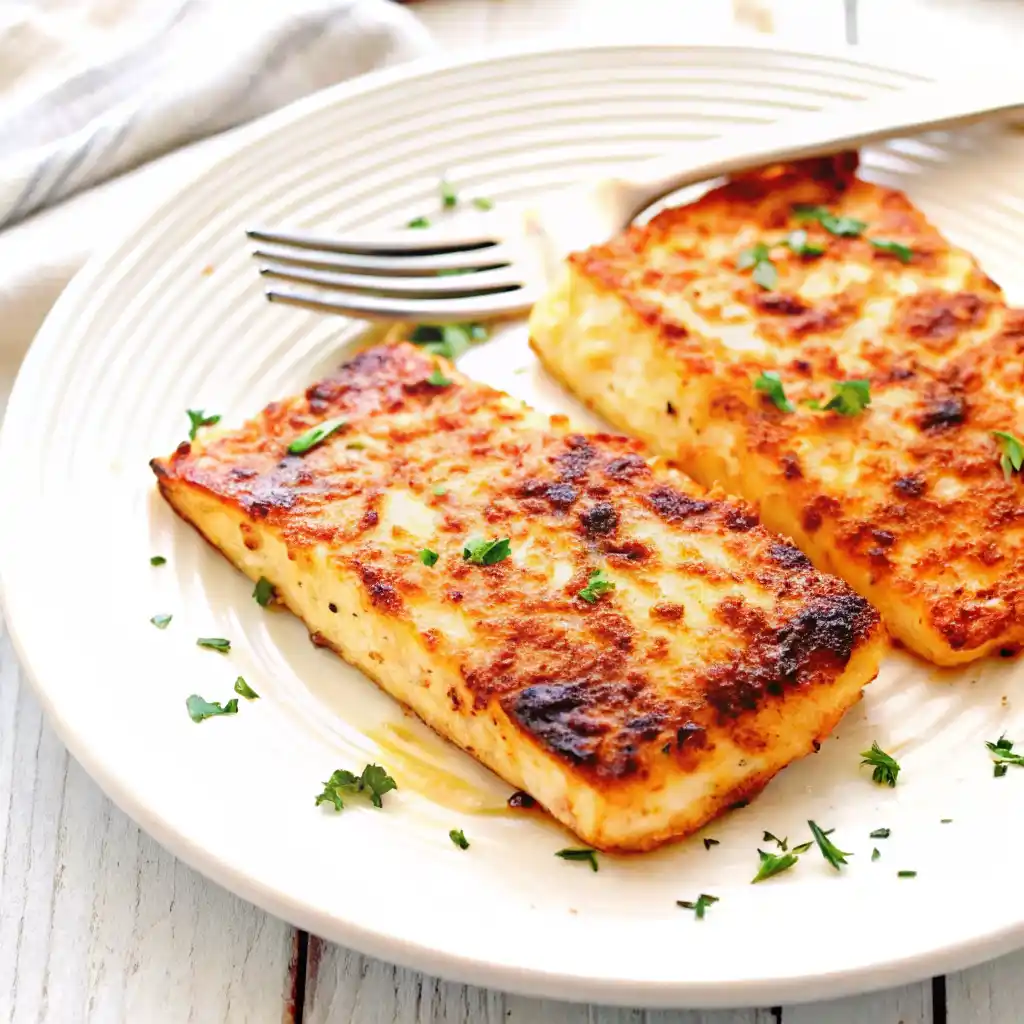Grilled halibut is more than just a seafood dish—it’s a mouthwatering experience that captures the fresh, clean flavors of the ocean while delivering a smoky, charred finish that’s hard to beat. Whether you’re a grilling novice or a seasoned backyard pitmaster, getting halibut right on the grill can feel like a culinary challenge. But don’t worry, this guide is here to make it simple, delicious, and downright impressive.
In this article, you’ll discover everything you need to know about grilling halibut to perfection. From selecting the best fish and prepping it right, to nailing the cooking time and pairing it with flavor-packed sides, we’ve got you covered. Along the way, we’ll also compare grilling with other popular cooking methods like baking, and answer those burning questions seafood lovers ask, like “How long does halibut take to grill?” and “Is it better to grill or bake halibut?”.
Let’s dive right into the essential basics of grilled halibut and what makes it such a star on the grill.
Discover great ideas like grilling techniques for beginners and expert halibut recipes by exploring our seafood cooking guide.
Table of Contents
Understanding Grilled Halibut Basics
What is Halibut? Characteristics and Nutritional Value
Halibut is a lean, firm, and flaky white fish prized for its delicate texture and mild, slightly sweet flavor. Native to cold waters like the North Pacific and North Atlantic, halibut belongs to the flatfish family and can grow impressively large, often weighing over 100 pounds. Its thick fillets make it perfect for grilling since they hold together well on the grates, unlike more delicate fish that tend to fall apart.
Nutritionally, halibut is a powerhouse. It’s loaded with lean protein, making it an excellent option for those looking to maintain muscle while watching their calorie intake. It’s also rich in essential nutrients like omega-3 fatty acids, which support heart and brain health, along with magnesium, potassium, and B vitamins. Grilled halibut, in particular, retains most of these nutrients while keeping the added fats to a minimum, especially when compared to frying.
When you opt for grilled halibut, you’re not only treating your taste buds but also doing your body a favor. It’s no wonder this fish often tops the list in healthy seafood choices.
Why Choose Grilling Over Baking? Key Differences Explained
While both grilling and baking have their merits, grilling halibut often wins the flavor game. The high heat of the grill caramelizes the fish’s natural sugars, creating a delicious, slightly smoky crust that baking simply can’t match. Plus, grilling adds a depth of flavor without overwhelming halibut’s delicate taste, making it a favorite among seafood enthusiasts.
When you bake halibut, you get a more uniform, gentle cook, which is great for retaining moisture. However, it lacks the char and smokiness that make grilled halibut so irresistible. The direct heat from the grill also shortens cooking time, locking in juices and keeping the fish from drying out—a common mistake with halibut.
In terms of texture, grilled halibut offers a delightful contrast between its crispy exterior and tender interior. Baking, on the other hand, yields a uniformly soft and flaky result, which some might find less exciting on the palate.
Preparing Halibut for Grilling Success
Selecting the Best Fresh or Frozen Halibut for Grilling
The success of your grilled halibut starts at the seafood counter. Whether you’re sourcing fresh or frozen fillets, knowing what to look for makes all the difference. For fresh halibut, check for firm flesh that bounces back when pressed, with a moist, translucent appearance and a clean, ocean-like scent. Any fishy or sour smell is a big red flag.
When choosing frozen halibut, opt for vacuum-sealed packages free from ice crystals or freezer burn. Always thaw your fish properly in the fridge overnight for best texture and taste. Flash-frozen halibut can be just as good as fresh when handled right, especially if you live far from the coast.
Skin-on fillets are generally preferred for grilling because the skin helps keep the delicate fish intact on the grates, adding extra flavor and texture. You can always remove the skin after grilling if desired.
How to Marinate Halibut for Maximum Flavor
One of the easiest ways to make grilled halibut shine is through a simple, well-balanced marinade. Since halibut has a delicate flavor, avoid overpowering ingredients. A classic mix of lemon juice, olive oil, garlic, fresh herbs like dill or parsley, and a dash of sea salt does wonders. The acidity of lemon not only infuses the fish with brightness but also tenderizes it slightly.
Marinate halibut for no longer than 30 minutes. Going beyond that risks breaking down the fish too much, resulting in a mushy texture. For a bold twist, try Asian-inspired marinades with soy sauce, ginger, and sesame oil, or Mediterranean blends with oregano, capers, and lemon zest.
Another insider tip? Pat your marinated halibut dry before placing it on the grill to ensure a perfect sear and prevent sticking.

Don’t miss our foolproof guide to selecting fresh seafood at the market and learn how to sauté shrimp perfectly.
Grilled Halibut Techniques for Perfect Results
Best Tools and Equipment for Grilling Halibut
Grilling halibut like a pro doesn’t require fancy gadgets, but a few essential tools can elevate your cooking game and prevent common mistakes. First, ensure your grill grates are clean and well-oiled. Halibut is lean, which means it’s prone to sticking if your grill isn’t prepped properly.
Investing in a high-quality fish spatula is a game-changer. Its thin, flexible edge slides easily under delicate halibut fillets without tearing them apart. If you’re worried about sticking, consider using a fish grilling basket or placing the fish on cedar planks for extra flavor.
For optimal results, always preheat your grill to medium-high heat (around 400°F). Using an instant-read thermometer ensures your grilled halibut is cooked safely without overdoing it. Aim for an internal temperature of 130°F to 135°F, letting it rest to finish at 140°F.
Mastering Cooking Times and Temperatures for Grilled Halibut
Timing is everything when it comes to grilled halibut. Overcooking this lean fish is the fastest way to end up with dry, rubbery fillets. A good rule of thumb is to grill halibut for about 8 to 10 minutes per inch of thickness, flipping only once.
Start by grilling the skin side down first to help the fillet hold together and develop a beautiful char. Flip carefully with a fish spatula once the flesh turns opaque about halfway up. Avoid constantly moving the fish around the grill—patience pays off with those signature grill marks and a flaky texture.
Grilled halibut is done when the flesh flakes easily with a fork but remains moist inside. Remember, carryover cooking continues after you pull it off the heat, so remove it slightly before it looks fully done.
Grilling Halibut Like a Pro
Step-by-Step Guide to Grilling Halibut on Gas and Charcoal Grills
Perfectly grilled halibut comes down to precision and prep. Whether you’re using a gas grill or charcoal setup, the process remains fairly simple with a few slight adjustments.
For gas grills:
- Preheat your grill to medium-high heat (about 400°F).
- Clean and oil the grates well to prevent sticking.
- Lightly oil both sides of the halibut fillet and season or marinate as desired.
- Place the fillet skin-side down over direct heat.
- Close the lid and grill for 4–5 minutes per side for 1-inch thick fillets.
- Use a fish spatula to gently flip the fish halfway through.
For charcoal grills:
- Arrange the coals to create a two-zone fire—direct and indirect heat.
- Sear the halibut over direct heat for 2–3 minutes per side.
- Move it to indirect heat and close the lid to finish cooking.
- Always check for doneness using a thermometer or fork flake test.
No matter the grill type, resist flipping too soon. Let the fish naturally release from the grates. This means it’s ready to turn. Don’t forget to let your grilled halibut rest for 3–4 minutes before serving to lock in those savory juices.
Common Mistakes to Avoid When Grilling Halibut
Grilling halibut may seem easy, but even seasoned cooks make slip-ups. One major mistake? Overcooking. Halibut has very little fat, so it dries out fast. Stick to the recommended cook times and use a thermometer if in doubt.
Another error is skipping the oil. Even though halibut is firm, its delicate texture means it needs a little help to stay intact. Brushing the fish and grill grates with oil is a must.
Also, avoid moving the fish too much on the grill. Let it sear undisturbed to get that golden crust and prevent tearing. And be careful with strong marinades—overly acidic or salty mixtures can “cook” the fish before it even hits the heat, leaving it mushy.
Lastly, don’t forget to preheat your grill. Placing fish on a lukewarm surface guarantees sticking and uneven cooking.

Discover great ideas like cedar plank halibut and smoky seasoning blends, or check out our stuffed peppers without rice for your next grilling party.
Flavor Enhancements for Grilled Halibut
Top Marinades and Rubs for Grilled Halibut
When it comes to boosting the flavor of grilled halibut, less is often more. The mild, slightly sweet profile of halibut pairs beautifully with fresh, vibrant ingredients that complement rather than overpower the fish.
Popular marinades for grilled halibut include:
- Lemon-Garlic Herb Marinade: A simple combination of fresh lemon juice, minced garlic, olive oil, and chopped parsley or dill.
- Soy Ginger Glaze: Soy sauce, grated fresh ginger, honey, and sesame oil for an umami-packed twist.
- Mediterranean Style: Olive oil, lemon zest, oregano, capers, and a touch of crushed red pepper flakes.
For dry rubs, think gentle yet aromatic:
- Lemon Pepper Rub: Perfect for a citrusy punch.
- Smoky Paprika Rub: Adds depth without masking the fish’s natural flavors.
- Herb Blend Rub: A mix of dried thyme, rosemary, and basil brings out the fish’s earthiness.
Marinate halibut for 20 to 30 minutes max. Longer marination can compromise texture, especially with acidic ingredients like lemon or vinegar.
Best Sauces and Sides to Pair with Grilled Halibut
Grilled halibut is incredibly versatile when it comes to sauces and sides. Whether you’re after something light and citrusy or bold and creamy, the right pairing can elevate your dish to restaurant-quality.
Popular sauces for grilled halibut:
- Lemon Butter Sauce: Classic and always a hit.
- Mango Salsa: Sweet, tangy, and perfect for summer grilling.
- Garlic Cream Sauce: Adds richness without overpowering the delicate fish.
Ideal sides include:
| Side Dish | Why It Works |
|---|---|
| Grilled Asparagus | Light and crisp, mirrors the fish’s freshness |
| Quinoa Salad with Herbs | Adds texture and keeps the meal wholesome |
| Roasted Baby Potatoes | Earthy flavors balance the halibut’s mildness |
| Steamed Broccoli | Keeps the dish light and nutrient-packed |
For a tropical flair, try serving grilled halibut with pineapple salsa or coconut rice. For Mediterranean vibes, pair it with a Greek salad and tzatziki sauce.
Alternative Cooking Methods for Halibut
Is Baking Halibut a Good Option? Pros and Cons Compared
While grilled halibut is widely celebrated for its smoky char and flaky texture, baking halibut remains a popular method, especially for home cooks who prefer oven-friendly recipes. But how does it stack up against grilling?
Advantages of baking halibut:
- Gentler cooking method: Baking offers a more even, controlled heat, making it easier for beginners to avoid overcooking.
- Moisture retention: When baked with a cover or foil wrap, halibut stays moist and tender, reducing the risk of drying out.
- Convenience: Baking requires minimal attention once in the oven, allowing multitasking in the kitchen.
Disadvantages of baking halibut:
- Lack of char: Baking doesn’t deliver the smoky, caramelized crust that makes grilled halibut shine.
- Texture differences: The result is softer and more uniform, lacking the textural contrast of grilled fish.
For those seeking a lighter, clean-tasting dish, baking is a solid choice. However, if you crave complexity and depth of flavor, grilled halibut still reigns supreme.
Comparing Grilled Halibut to Other Popular Cooking Techniques
Aside from baking and grilling, halibut can also be prepared through methods like pan-searing, broiling, and steaming. Each offers a distinct outcome in taste and texture.
Pan-searing:
Quick and flavorful, pan-searing creates a golden-brown crust and keeps the inside moist. It’s perfect for weeknight meals but lacks the smokiness of grilled halibut.
Broiling:
High-heat broiling mimics grilling indoors, giving the halibut a nicely charred top. However, you need to watch it closely to prevent overcooking or burning.
Steaming:
Ideal for a delicate and healthy preparation, steaming halibut ensures moist, flaky flesh. The downside? It can be bland without vibrant sauces or seasonings.
Ultimately, grilled halibut offers the best balance of texture, flavor, and aroma, especially when paired with fresh herbs and citrus notes.
Check out our comparison of halibut cooking techniques and don’t miss our keto eggplant parmesan for more healthy cooking inspiration.
Health Benefits of Grilled Halibut
Nutritional Breakdown and Health Advantages
Grilled halibut isn’t just a feast for your taste buds; it’s also a powerful addition to a healthy diet. One 3-ounce serving of halibut provides around 20 grams of lean protein while keeping calories and fat in check. Thanks to its high protein content, grilled halibut supports muscle growth and repair, making it a popular choice among fitness enthusiasts.
What sets halibut apart from many other fish is its impressive profile of essential nutrients. It delivers significant amounts of:
- Omega-3 fatty acids: Beneficial for reducing inflammation and supporting heart and brain health.
- Potassium and magnesium: Essential minerals for muscle function, blood pressure regulation, and nerve health.
- Vitamin D and B vitamins: Support immune function, energy production, and healthy bones.
Unlike fried fish, grilled halibut retains its nutrients without unnecessary fats, oils, or calories, making it an ideal pick for anyone following a balanced, heart-healthy diet.
Why Grilled Halibut is Ideal for Weight Loss and Heart Health
If you’re watching your waistline or aiming to boost your heart health, grilled halibut should definitely make your meal rotation. Its low calorie and low fat profile means you can indulge without guilt. Plus, the omega-3s found in halibut help reduce triglycerides, lower blood pressure, and decrease the risk of heart disease.
Additionally, its high satiety factor—thanks to its protein punch—helps curb cravings and keeps you feeling fuller longer. This makes grilled halibut an excellent option for those looking to lose or manage weight without sacrificing flavor.
Pair grilled halibut with fiber-rich sides like roasted vegetables or quinoa salad, and you have a balanced, heart-smart meal that checks all the right boxes.
Learn more about the nutritional power of halibut and don’t miss our guide to caramelized onions for perfect flavor pairing.
Grilled Halibut Recipes and Variations
Simple Grilled Halibut with Lemon and Herbs Recipe
Sometimes the best dishes are the simplest, and grilled halibut with lemon and herbs is a shining example. This recipe lets the fish’s delicate flavor shine through while enhancing it with citrusy brightness and herbal freshness.
Ingredients:
- 2 halibut fillets (about 1-inch thick)
- 2 tablespoons olive oil
- 1 lemon (zested and juiced)
- 2 cloves garlic (minced)
- 1 tablespoon fresh dill or parsley (chopped)
- Salt and freshly ground black pepper to taste
Instructions:
- Preheat grill to medium-high heat (400°F).
- In a small bowl, mix olive oil, lemon juice, zest, garlic, and herbs.
- Brush the halibut fillets generously with the marinade on both sides.
- Grill the halibut skin-side down for 4-5 minutes, then flip and grill for another 3-4 minutes or until the fish flakes easily.
- Garnish with extra herbs and serve with lemon wedges.
This easy grilled halibut recipe pairs well with a light arugula salad, grilled vegetables, or quinoa for a wholesome, flavorful meal.
International Inspired Grilled Halibut Dishes You Must Try
Take your grilled halibut to new culinary heights with these globally inspired twists:
- Asian-Style Soy Ginger Halibut:
Marinate halibut in soy sauce, ginger, garlic, and sesame oil, then grill and serve with a side of stir-fried bok choy and jasmine rice. - Mediterranean Lemon-Oregano Grilled Halibut:
Infuse halibut with a bold marinade of lemon juice, olive oil, oregano, and capers. Serve alongside a Greek salad and roasted potatoes. - Caribbean Jerk Grilled Halibut:
Rub halibut with a homemade jerk seasoning mix and grill for a fiery, smoky finish. Pair with pineapple salsa and coconut rice. - Southwest Cilantro Lime Grilled Halibut Tacos:
Grill halibut with lime juice and cumin, then flake it into warm tortillas topped with avocado, slaw, and chipotle mayo.
These creative recipes prove grilled halibut is a global culinary canvas waiting to be explored.

Discover great ideas like international seafood dishes and try pairing your grilled halibut with Moroccan lamb meatballs.
FAQs About Grilled Halibut
Is it better to grill or bake halibut?
How long does halibut take to grill?
What is the best method of cooking halibut?
What does grilled halibut taste like?
Conclusion
Grilled halibut is truly the star of the seafood world—delivering a flawless balance of smoky, juicy, and flaky textures with every bite. From selecting the freshest fillet and marinating it to perfection, to nailing the grill time and pairing it with vibrant sides and sauces, the possibilities are endless. Whether you’re a health enthusiast looking for a low-fat, high-protein meal or simply craving a flavorful seafood dish, grilled halibut won’t disappoint.

